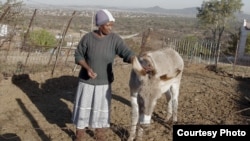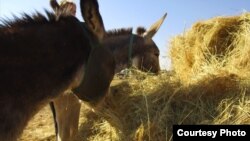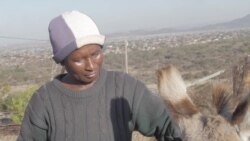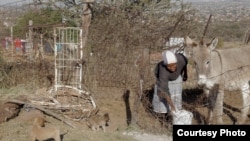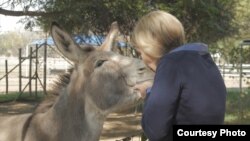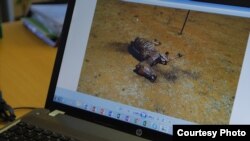Mpho Mashele’s eight donkeys are her most precious possessions, and her family’s lifeline.
They use them to transport goods in this small, rural village north of South Africa’s capital, Pretoria.
“We love our donkeys because they’re the only source of income,” she said. “Without them, we will starve.”
That threat is looming ever-larger amid a spike in donkey poaching in South Africa. Rural, often poor South Africans, like Mashele, say they've been forced to sell their precious donkeys at a loss or face having them stolen by poachers who are eager to satisfy a growing demand for donkey parts from the Chinese market.
She used to have 12 animals. But four were killed earlier this year, victims of China’s voracious multimillion-dollar trade in donkey hides. Mashele’s husband found their mutilated bodies in a neighboring village.
“We found pieces of the donkeys,” she said, while stroking the forehead of one of her remaining donkeys. “We recognized it was our donkeys because of a white patch on one of their foreheads. And the skins were gone.”
Donkey extinction?
Animal rights activists say the situation has escalated to the point where South African donkeys could soon be wiped out.
South Africa’s Society for the Prevention of Cruelty to Animals has, in the past year, confiscated more than 1,000 hides headed for China, says chief inspector Mpho Mokoena.
If this continues, she says, South Africa’s donkeys may be staring down extinction.
“In two years there won’t be [any] donkeys in South Africa,” she told VOA.
Often, she says, the animals are bludgeoned with hammers or skinned alive. Their hides are then boiled down and made into gelatin, which is believed to treat a variety of ailments. Their flesh is often left behind to rot.
Saving donkeys
Animal welfare activists say they’re doing their best to protect these vulnerable creatures. The Highveld Horse Care Unit, south of Johannesburg, rescues and cares for threatened donkeys. About 20 donkeys are currently in their care.
Inspector Ashley Ness says the skin of a donkey could fetch more than $500 in China. That demand, she says, has driven up the price of donkeys at livestock auctions.
But kept alive, they can be used as beasts of burden, as therapy animals, or for their milk. They also can be loving companions.
“They absolutely do have their own personalities,” Ness said, pointing to Chili, a docile male donkey at the sanctuary. “They really can form such a part of the family.”
She and other activists are urging South Africa to follow the lead of other African nations like Burkina Faso and Niger and ban the trade of donkey parts.
“A lot of the countries have actually banned the slaughter and trade of donkeys, which I believe is a lovely, great step in the right direction,” she said.




